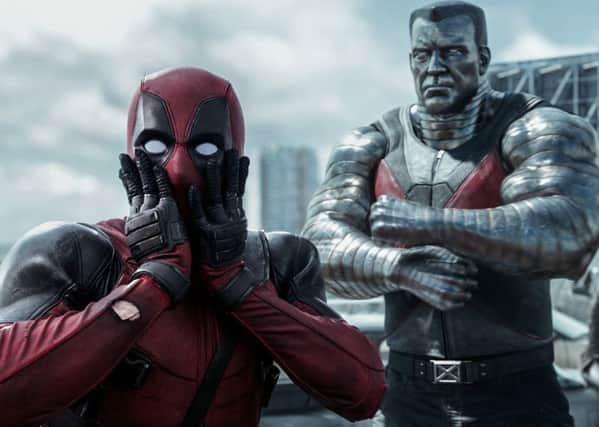Film reviews: Deadpool 2 | Filmworker | Cambodian Spring


Deadpool 2 (15) ***
Filmworker (15) ****
Cambodian Spring (15) ****
One of the most hilarious things about the original Deadpool wasn’t the script – the film wasn’t particularly laugh-out-loud funny – but the commentary surrounding its appetite for deconstruction. Pitched as the antidote to the glut of family-friendly, hugely profitable, somewhat risk-averse superhero films that have dominated cinemas for much of this century, its ultra-violent evisceration of every comic book movie convention clicked with audiences who seemed to get a kick out of seeing Ryan Reynolds annihilating the fourth wall the way the Avengers destroy cities. There was just one thing: the lesser-seen Kick-Ass had already performed this function for superheroes in the modern age and the recent Jump Street movies had pushed self-aware genre satire to its glorious endpoint. Deadpool’s unexpected success wasn’t so much the shock of the new, then; it was the shock of seeing how effectively a big studio could monetise genre subversion now that general audiences were fully conversant in the cinematic language of superheroes.
Which isn’t to say it wasn’t entertaining. It just wasn’t as transgressive as its inbuilt self-referential marketing campaign would have had you believe. The same might be said for Deadpool 2. The inevitable sequel draws attention to its own inevitability right from the off and the pop culture gags come thick and fast, from ongoing digs at X-Men stablemate Wolverine and DC rivals like Batman and Superman, to Marvel’s current box-office behemoth, Avengers: Infinity War (both Infinity War and Deadpool 2 star Josh Brolin as their respective villains so you can probably guess what the joke might be). This time out the film kicks off with the indestructible Deadpool attempting to commit suicide for reasons soon revealed in an elaborate flashback. But even this flashback functions as a call-back to the first film’s own flash-backing structure, which along with Reynolds’s sardonic voice-over immediately serves as a wink and a nod, reassuring us that the new film will have the same irreverent tone. And so it proves. After swiftly establishing, commenting upon and making fun of the most cliché-ridden plot motivation imaginable for an antihero in love, the bulk of the film focuses on Deadpool attempting – in his cynical, trying-not-to-care way – to save a rage-filled mutant teenager with pyrotechnic powers from a super-soldier from the future (Brolin’s Cable) intent on killing him, Terminator-style.
Advertisement
Hide AdThe good news here is that the kid – he’s called Russell – is played by Julian Dennison, the break-out New Zealand star of Taika Waititi’s Hunt for the Wilderpeople. Dennison does a nice line in adolescent petulance, calling out the lack of opportunities for plus-sized superheroes while hinting at a darker aspect of his character’s backstory.
The film’s other plus-point is up-and-coming actress Zazie Beetz as new character Domino, a preternaturally lucky superhero whom Deadpool recruits as part of a team of reprobate caped-crusaders he’s banded together to help him save Russell. The Avengers/Justice League/Suicide Squad-mocking team-up results in the films most inspired set-piece – involving a disastrous parachute jump and a blink-and-you’ll miss it cameo from certain Hollywood A-lister – but its hilarity is sullied come the end of the movie by the realisation that this is also the film’s own insidious way of setting up another team-based superhero spin-off franchise. And that’s where the film repeatedly blunts its own edge.
Though in many respects Deadpool 2 is funnier, filthier and certainly better directed in the action stakes than its predecessor (thanks to the presence of John Wick director
David Leitch behind the camera), it’s also a film that gleefully sacrifices sacred cows while remaining reluctant to touch any labelled “cash”.
The cult of Stanley Kubrick is taken to a new extreme with Filmworker, director Tony Zierra’s fascinating documentary portrait of Leon Vitali, a classically trained British actor who gave up a promising career in front of the camera to serve at the feet of the master. Having fallen in love with Kubrick’s work after seeing 2001, Vitali scored a major role in Barry Lyndon and became so enamoured with Kubrick on set he dedicated himself to working behind the scenes – from helping cast child actor Danny Lloyd in The Shining to more mundane tasks, such as creating a feline surveillance system so the director could keep track of his pets. As the previous sentence suggests, the film simultaneously dispels and reinforces various myths about the director and offers some incredible insights into the making of several Kubrick classics. Yet none of this detracts from how fascinating a figure Vitali himself is, or how vital he‘s been in the preservation of Kubrick’s legacy.
Cambodian Spring director Chris Kelly spent six years following local activists protesting the impact of developers on the residents of the Phnom Pen-suburb of Boeung Kak. Facing forcible eviction from their homes, they’re pitted against not just a faceless corporation in cahoots with Prime Minister Hun Sen’s dissent-blocking government, but against each other as the years-long struggle takes it toll personally on the women (ordinary wives and mothers) who emerge as its leaders.
Advertisement
Hide AdThe results are eye-opening and upsetting, putting paid to any notion that the country’s rapid transition
to a free market economy has enabled it to move on from the tragic, still-raw history of Pol Pot without creating a whole new set of bleak scenarios in the dubious name of progress. ■